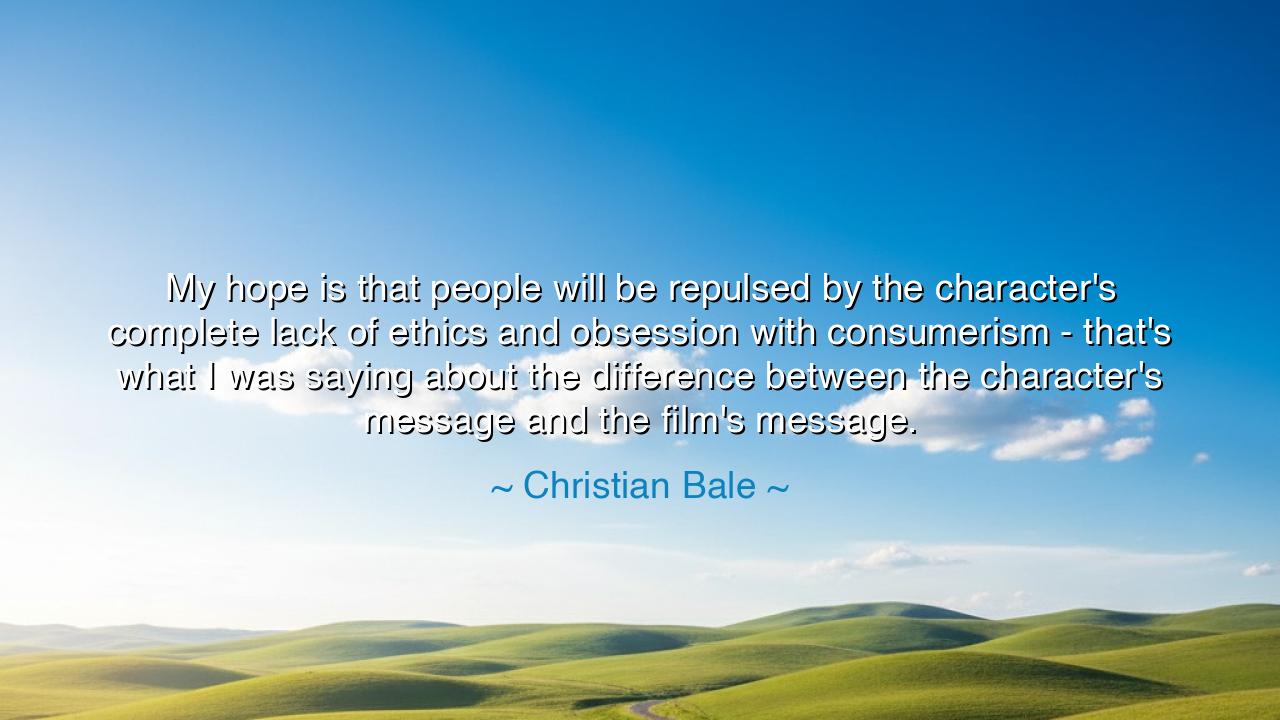
My hope is that people will be repulsed by the character's
My hope is that people will be repulsed by the character's complete lack of ethics and obsession with consumerism - that's what I was saying about the difference between the character's message and the film's message.






“My hope is that people will be repulsed by the character’s complete lack of ethics and obsession with consumerism—that’s what I was saying about the difference between the character’s message and the film’s message.” Thus spoke Christian Bale, the actor whose craft pierces beyond performance and into the realm of philosophy. In this reflection, he unveils a truth both artistic and moral: that the purpose of portraying darkness is not to glorify it, but to awaken the soul to its peril. His words refer to his haunting portrayal of Patrick Bateman in American Psycho, a man hollowed by greed, vanity, and the worship of possession. Through this line, Bale reminds us that art is a mirror, and sometimes that mirror must reflect the ugliness of man so that he may learn to turn away from it.
In the age of spectacle, when fame and wealth parade as gods, consumerism has become a new altar, and its worshippers believe that worth is measured in brands, bodies, and applause. Bale’s words cut through that illusion like a blade. The character’s lack of ethics is no accident; it is a deliberate creation meant to disturb the viewer into recognition. For the actor does not wish to entertain the darkness but to reveal it—to make the audience feel disgust not at fiction, but at the reflection of their own age. The difference between the character’s message and the film’s message is the difference between corruption and warning, between sickness and cure.
This understanding reaches deep into the roots of ancient wisdom. The Greek dramatists knew that tragedy was not meant to delight but to cleanse. When Sophocles showed the downfall of Oedipus, he was not celebrating his ruin but teaching the audience humility. When Dante wrote of Hell, he was not admiring sin but exposing its emptiness. So too does Bale’s portrayal serve a sacred function—it is catharsis through horror, the purification of the spirit through confrontation with what must never be admired.
In American Psycho, Patrick Bateman is not simply a killer of men; he is a symbol of a soul devoured by materialism. He lives in a city of mirrors and masks, where human worth is judged by suits, status, and skin. In portraying this emptiness, Bale hoped that the viewer would recoil, not because the violence was graphic, but because the emptiness felt too familiar. He held up a mirror to a generation that confuses image with identity, and in that reflection lies the warning: that when man loves things more than life, he becomes a thing himself—cold, polished, and without heart.
Consider, too, the lessons of ancient Rome, where luxury grew until virtue decayed. The Romans once conquered nations with courage and honor, but when gold filled their homes, greed emptied their souls. The poet Juvenal lamented how the citizens traded freedom for bread and circuses, their minds dulled by comfort. It was not invasion that destroyed Rome, but moral corrosion—the same rot Bale warns against. When a society becomes obsessed with consumption, it consumes itself.
Thus, the actor’s hope becomes a moral appeal to all creators and watchers alike: that we discern the difference between message and messenger, between performance and principle. The danger lies not in showing evil, but in mistaking evil for beauty. Bale’s craft, like the art of the ancients, demands that we feel discomfort—not as punishment, but as awakening. It is through that discomfort that conscience stirs, and the spirit remembers what it means to be human.
The lesson, then, is this: do not admire the mask of corruption; learn from its emptiness. In a world driven by wealth, let integrity be your wealth. When you see vanity exalted, remember that it is only a shadow on the wall. Seek not to possess, but to create; not to impress, but to understand. Let your measure of success be not what you own, but what you are.
And so, through the voice of an actor speaking of his role, we hear an echo of eternal wisdom: that art is not meant to seduce us into darkness, but to lead us back into light. Christian Bale’s words remind us that the truest performance is not on the stage or the screen, but in life itself—where each of us must choose, again and again, whether to live as a consumer or as a soul.






AAdministratorAdministrator
Welcome, honored guests. Please leave a comment, we will respond soon